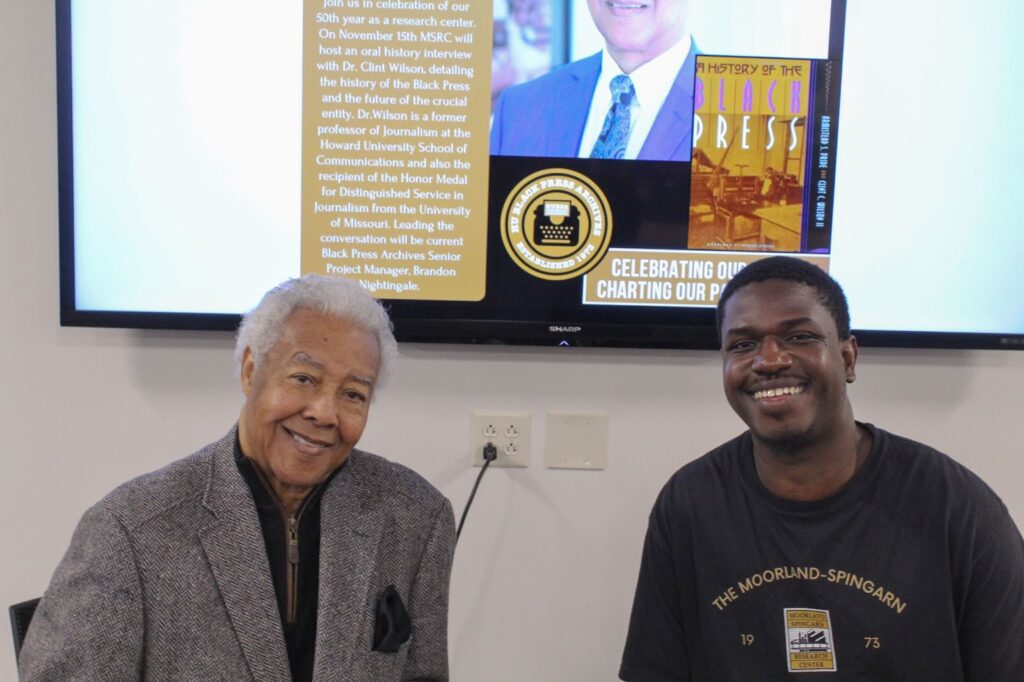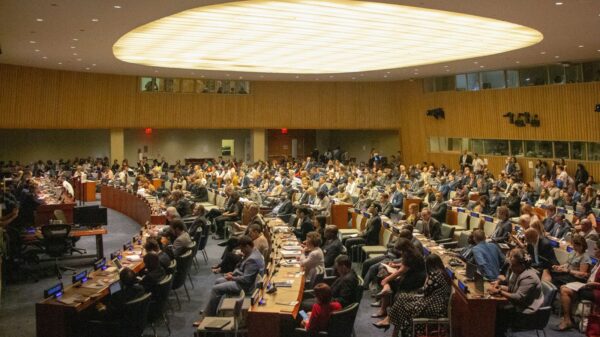The Moorland-Spingarn Research Center celebrated its 50-year anniversary with a symposium held in the Wayne A.I. Frederick Undergraduate Library last week, reaffirming its commitment to preserving history at Howard University.
The Nov. 15 event honored Dr. Michael R. Winston, who served as the first-ever director of the research center starting in 1973 along with other distinguished staff members who played an integral part in the success of the archives. Former and current staff and students connected and fondly discussed the importance of the center.
The Moorland Library was founded in 1914 to hold a vast collection of books and memorabilia documenting Black history. It was later expanded as the Moorland-Spingarn Research Center under the leadership of Winston and still remains one of the world’s “largest and most comprehensive repositories” of documents, books and ephemera for the Black experience, according to their website.
This year, the center is celebrating 110 years since its inception as a library and 50 years of its research divisions.
In attendance were several students who work in the Moorland-Spingarn Research Center, like Zoé Coker, a senior Africana studies major from Houston. Coker said the center’s focus on archival research is important for its mission of preserving history.
“It’s tangible evidence of history,” she said. “You can have a more authentic relationship with your history and I think it’s really important to house that.”
Coker credited Dr. Benjamin Talton for getting students involved and working at the research center. Talton currently serves as director of the research center.
Coker explained how Talton “connects students to their interests” through the center’s many departments including archives, manuscripts, and other library auxiliary services. Through these departments, undergraduate students have the opportunity to contribute to the work of the research center and enhance their education by interning with the center.
“He brings in all different types of people and then the creativity comes in from there,” she added.
Talton spoke glowingly about the student interns he worked alongside during the symposium. He said, “When I think of our future… when I think of Moorland-Spingarn students, I’m not even proud, I’m not even confident. I’m grateful for the legacy that they’re going to be carrying on.”
The event featured a panel of veteran staff members of the research center including Dr. Thomas Battle, Paul Coates, Sonja N. Woods, Dr. Janet Sims-Wood, and Dr. Michael R. Winston. A video presentation was displayed highlighting the history of the center and Winston’s work as founding director.
Alexis Smith, a freshman African American studies major from Louisiana, who had only recently learned of the center when she was assigned to attend the symposium, said she has since become interested in the archives.
“A lot of good things come out of this, so it’s important to see what happened in the past and how it reflects students now,” Smith said.
Rebecca Haynesworth, a media management major from Raleigh, North Carolina, who also works as a student intern with the Moorland-Spingarn Research Center expressed the importance of the 50th anniversary event.
“It’s so important to commemorate the anniversary of our institutions, but specifically Moorland-Spingarn because our institutions have been and still are under attack and are on the verge of extinction,” Haynesworth said.

While some HBCUs have been historically underfunded, according to NPR, Howard University and the research center have avoided extinction. While Howard University is a private institution, it is federally chartered and received an appropriation of $217 million for fiscal year 2022. This past February, the Moorland-Spingarn Research Center received a $2 million grant from the Mellon Foundation to support its archival collections.
Moderator Teddy Abebe opened the second session of the event with a story recalling a headline published by The Hilltop detailing Moorland-Spingarn Research Center’s impending closure in 2009. Despite this threat of closure after significant cuts to funding throughout the years, the research center managed to survive after a subsequent symposium which Abebe expressed helped to solidify the center at the university.
Additionally, founding director Michael R. Winston thanked his fellow panelists for keeping the research center afloat during what he described as “lean times.”
Haynesworth said the symposium left her feeling inspired.
“Being able to hear first-hand some of the countless stories and memories from former directors and some of our oldest staff, inspired me to be a part of the succeeding generation to preserve the sacredness of this space and share it with the larger Black community,” she said.
Copy edited by Alana Matthew













